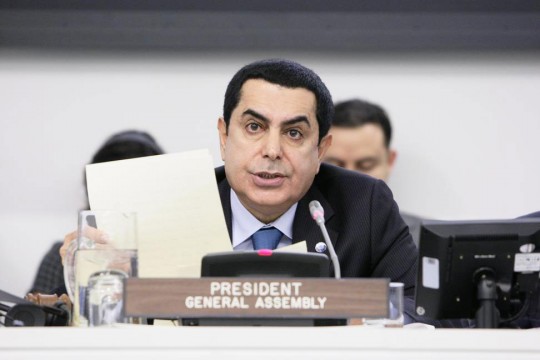Diasporas have important role to play in fostering development, says Assembly President
Diasporas have important role to play in fostering development, says Assembly President
2 December 2011 –
“Our collective action must be directed towards supporting diasporas, so that their contributions to development might achieve their full potential,” said Nassir Abdulaziz Al-Nasser in remarks to the 2011 Forum on Diaspora Economy, which were delivered on his behalf by his Chief of Staff, Mutalq Al-Qahtani.
“Diasporas are at the forefront of economic globalization,” he added. “In recent years, there has been a rise in international awareness of diaspora’s important economic contributions, both to their countries of origin and of destination.”
The Forum, held in New York, takes place ahead of next week’s General Assembly High-Level Dialogue on Financing for Development, scheduled for 7 and 8 December.
Diasporas help foster development in several ways, Mr. Al-Nasser noted, beginning with the mobilization of domestic resources, including by means of remittances that are used to set up businesses.
They also help mobilize international resources, including by facilitating foreign direct investments by means of their knowledge of local cultures and business practices.
Diasporas also help foster development through international trade, noted the President, by actions such as speeding up the flow of information, fostering business trust and creating personal connections across borders.
They also help foster international financial and technical cooperation, such as when foreign-trained professionals and scientists from developing countries take part in formal or informal information exchanges with colleagues from their countries of origin.
“The positive contributions of the diasporas are evident, but they have not yet achieved their full potential,” he stated. “I hope that this timely event will help shed light on the challenges posed, and the opportunities offered by this untapped potential.”
He also highlighted the need to urgently address the plight of migrant workers in the current global financial and economic crisis, noting that many members of the diasporas are among the most vulnerable to economic shocks.
“Their remittances, as I have mentioned before, are an important source of private funding for many development activities. They have been negatively affected by rising unemployment and weak earnings growth in some host countries,” he added.
###
> United Nations (UN).
 The United Nations was established on 24 October 1945 by 51 countries committed to preserving peace through international cooperation and collective security. Today, nearly every nation in the world belongs to the UN: membership totals 192 countries.
The United Nations was established on 24 October 1945 by 51 countries committed to preserving peace through international cooperation and collective security. Today, nearly every nation in the world belongs to the UN: membership totals 192 countries.
When States become Members of the United Nations, they agree to accept the obligations of the UN Charter, an international treaty that sets out basic principles of international relations. According to the Charter, the UN has four purposes:
- to maintain international peace and security;
- to develop friendly relations among nations;
- to cooperate in solving international problems and in promoting respect for human rights;
- and to be a centre for harmonizing the actions of nations.
###
* The above story is adapted from materials provided by United Nations (UN)
** More information at United Nations (UN)





















